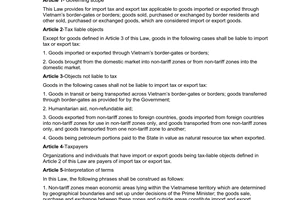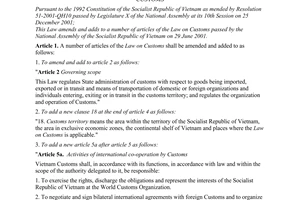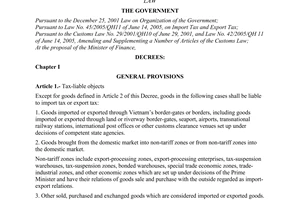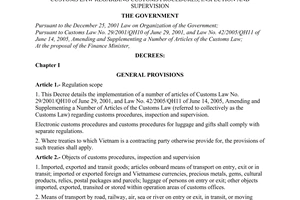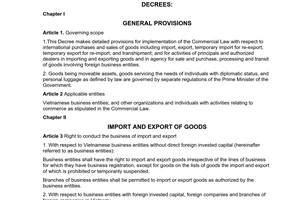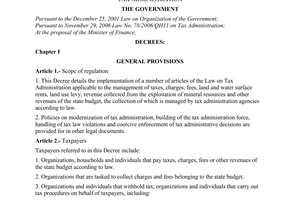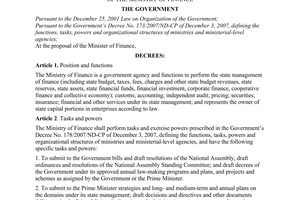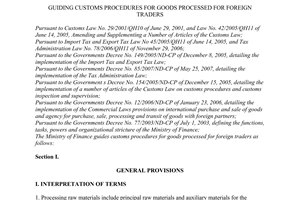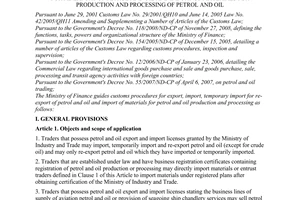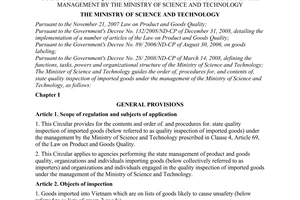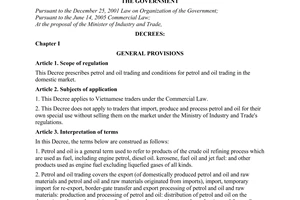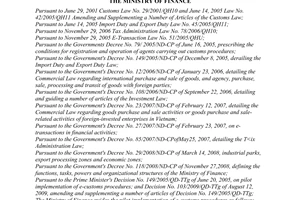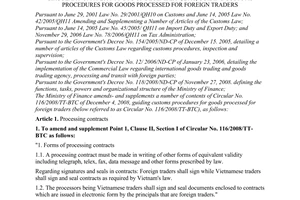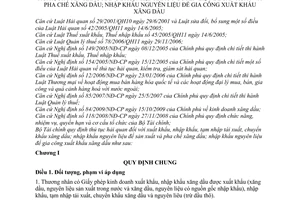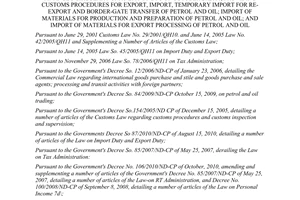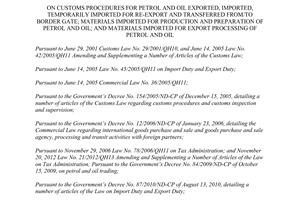Circular No. 165/2010/TT-BTC guiding customs procedures for export, import, temp đã được thay thế bởi Circular No. 139/2013/TT-BTC customs procedures for export import of petrol and oil và được áp dụng kể từ ngày 25/11/2013.
Nội dung toàn văn Circular No. 165/2010/TT-BTC guiding customs procedures for export, import, temp
|
THE
MINISTRY OF FINANCE |
SOCIALIST
REPUBLIC OF VIET NAM |
|
No. 165/2010/TT-BTC |
Hanoi, October 26, 2010 |
CIRCULAR
GUIDING CUSTOMS PROCEDURES FOR EXPORT, IMPORT, TEMPORARY IMPORT FOR RE-EXPORT AND BORDER-GATE TRANSFER; IMPORT OF MATERIALS FOR PRODUCTION AND MIXTURE; AND IMPORT OF MATERIALS FOR EXPORT PROCESSING OF PETROL AND OIL
Pursuant to June 29, 2001
Customs Law No. 29/2001/QH10 and June 14, 2005 Law No. 42/ 2005/QH11 Amending
and Supplementing a Number of Articles of the Customs Law;
Pursuant to June 14, 2005 Law No. 45/2005/ QH11 on Import Duty and Export Duty;
Pursuant to November 29, 2006 Law No. 78/ 2006/QH11 on Tax Administration;
Pursuant to the Government's Decree No. 149/2005/ND-CP of December 8, 2005,
detailing the Law on Import Duty and Export Duty;
Pursuant to the Government's Decree No. 154/2005/ND-CP of December 15, 2005,
detailing a number of articles of the Customs Law regarding customs procedures
and customs inspection and supervision;
Pursuant to the Government's Decree No. 12/ 2006/ND-CP of January 23, 2006,
detailing the Commercial Law regarding international goods purchase and sale
and goods purchase, sale, processing and transit agency activities with foreign
countries;
Pursuant to the Government's Decree No. 85/ 2007/ND-CP of May 25, 2007,
detailing the Law on Tax Administration;
Pursuant to the Government's Decree No. 84/ 2009/ND-CP of October 15, 2009, on
petrol and oil trading;
Pursuant to the Government's Decree No. 118/2008/ND-CP of November 27, 2008,
defining the functions, tasks, powers and organizational structure of the
Ministry of Finance;
The Ministry of Finance guides customs procedures for export, import, temporary
import for re-export and border-gate, transfer; import of materials for
production and mixture; and import of materials for export processing of petrol
and oil as follows:
Chapter I
GENERAL PROVISIONS
Article 1. Objects and scope of application
1. Traders that possess petrol and oil export and import licenses may export (petrol, oil and materials, home-made or of import origin), import, temporarily import for re-export and transfer from border gate to border gate petrol and oil and materials (except crude oil).
2. Traders that are established under law and possess business registration certificates containing registration of petrol and oil trading and have sufficient conditions for petrol and oil production may:
2.1. Directly import or entrust traders defined in Clause 1 of this Article to import materials for production and mixture of petrol and oil under registered plans after obtaining written certification of the Ministry of Industry and Trade; export petrol and oil products produced and mixed from imported materials.
2.2. Directly import or entrust traders defined in Clause 1 of this Article to import materials for export and export processing of petrol and oil.
3. Traders that possess petrol and oil export and import licenses stating the business line of supply of aviation petrol and oil or provision of seagoing ship chandlery services may sell petrol and oil by themselves or through seagoing ship chandlers acting as their agents to:
3.1. Aircraft of foreign airlines stopping over at Vietnamese airports and aircraft of Vietnamese airlines flying along international routes.
3.2. Foreign seagoing ships mooring at international seaports or river ports and outbound Vietnamese seagoing ships operating along international routes.
Article 2. Some particular provisions
1. In case of physical inspection of petrol, oil and materials imported for petrol and oil production or export processing, customs officers shall base themselves on results of assessment conducted by assessment service providers (below referred to as assessors) of petrol and oil category, volume (petrol and oil volumes in cubic meters or barrels must be converted into tons upon customs declaration), weight and quality, to give certification of results of physical inspection in customs declarations.
2. Petrol and oil are allowed to be pumped into depots or other vehicles only after their customs declarations have been registered by Customs Sub-Departments (at which traders carry out customs procedures) according to customs declaration registration procedures under the Customs Law.
3. Petrol and oil temporarily imported for re-export may be retained in Vietnam for not more than 120 days after the date of completion of customs procedures for temporary import. When necessary to retain such petrol and oil for a longer period, traders shall request in writing Customs Sub-Departments at which they carry out temporary import procedures to extend this time limit. Extension may be made twice at most, each not exceeding 30 days for each lot temporarily imported for re-export.
4. In case petrol and oil imported or temporarily imported for re-export and materials imported for petrol and oil production or mixture or for export processing are subject to quality inspection but have not yet obtained notices of results of state quality inspection of their lots satisfying import quality requirements:
4.1. For imported petrol and oil;
a/ If traders' depots have empty tanks or cisterns, imported petrol and oil may be pumped into these tanks or cisterns. Upon completion of the pumping, customs officers shall seal up these tanks or cisterns. Only after the notice of results of state quality inspection states that the quality of such petrol and oil lots satisfies import quality requirements, shall customs officers decide on customs clearance and may traders remove customs seals and put their petrol and oil into use.
b/ If traders' depots have no empty tanks or cisterns, imported petrol and oil shall be pumped into tanks or cisterns currently containing petrol and oil of the same category. After the pumping, customs officers shall seal up the tanks or cisterns and wait for quality inspection results. If the quality inspection agency notifies that the imported petrol and oil lot fails to satisfy import quality requirements, the whole volume of petrol and oil (both old and new) shall be handled under law. Traders shall bear responsibility before law for this case.
c/ If tanks and cisterns of a petrol and oil depot are linked by pipelines, after petrol and oil are pumped from transporting vehicles into such tanks and cisterns, customs officers are not required to seal up these tanks and cisterns but shall ask petrol and oil owners to take responsibility before law for keeping such petrol and oil intact till availability of conclusions of a state inspection agency on the quality of such petrol and oil. If the quality inspection agency notifies that the imported petrol and oil lot fails to satisfy import quality requirements, customs officers shall decide to handle such petrol and oil depending on their actual quality under Item b. Point 4.1, Clause 4. Article 2 of this Circular.
4.2. For petrol and oil temporarily imported for re-export:
a/ If petrol and oil are pumped into empty tanks or cisterns, they and their customs seals shall be kept intact till they are re-exported, while quality inspection is not required.
b/ If petrol and oil are pumped into tanks or cisterns currently containing petrol and oil. the following conditions must be satisfied:
b1. Temporarily imported petrol and oil and those contained in these tanks or cisterns are of the same category.
b2. State quality inspection is conducted in the same way as for imported petrol and oil.
If the quality inspection agency notifies that the imported petrol and oil lot fails to satisfy import quality requirements, such petrol and oil shall be handled under Item b. Point 4.1, Clause 4. Article 2 of this Circular.
4.3. For petrol and oil transshipped or transferred alongside from ship to ship:
Customs declaration shall be made to Customs Sub-Departments prior to transshipment or transfer alongside from ship to ship. Customs clearance shall be allowed for petrol and oil after traders submit notices of results of slate quality inspection staling that such petrol and oil satisfy import quality requirements. Petrol and oil transshipped or transferred alongside from ship to ship must be stored in separate depots, tanks or cisterns.
4.4. For materials imported for petrol and oil production or mixture or export processing:
Customs offices shall carry out import procedures for these materials only when traders submit notices of results of state quality inspection stating that such .materials satisfy import quality requirements.
5. Determination of volumes:
5.1. For petrol and oil exported, imported, temporarily imported for re-export by seagoing ships or river ships (on waterways to Cambodia): Their volumes shall be determined on the basis of assessment certificates granted by assessors with the function of assessing petrol and oil volumes.
5.2. For petrol and oil exported or re-exported by tank or cistern trucks through land border gates: Their volumes shall be determined based on readings of depots' meters used to gauge petrol and oil pumped into trucks tanks or cisterns, assessment certificates granted by assessors with the function of assessing volumes or lest cards of petrol and oil traders.
In places without assessors, petrol and oil volumes shall be determined based on benchmarks of their transporting vehicles which have certificates granted by an inspection agency.
5.3. Oil volumes (including oil imported or temporarily imported) sold to seagoing ships are determined as follows:
a/ Oil volumes pumped directly from depots into seagoing ships shall be determined based on readings of depots' meters.
b/ Oil volumes pumped from inland depots into transporting vehicles shall be determined based on readings of depots' meters. Oil volumes pumped from transporting vehicles into seagoing ships shall be determined by any of the following methods: assessment, benchmark or meter, depending on particular conditions of each seagoing ship and the applicable practice.
5.4. Jet fuel (imported or temporarily imported) sold to aircraft shall be determined based on readings of flow meters of filling devices exclusively used for aircraft.
5.5. Volume meters must be inspected, certified and sealed up by a state standardization and metrology office and periodically checked under law (except meters of aircraft and seagoing ships).
5.6. If the volume of actually imported or exported petrol and oil is different from that written on invoices but consistent with that written on contracts due to their characteristics the petrol and oil volume used for tax calculation is that assessed on the transporting vehicle or at its unloading and loading place.
6. Determination of categories of exported or re-exported petrol and oil:
6.1 Cases not subject to assessment:
a/ Export or re-export of petrol and oil from separate tanks or cisterns with unbroken customs seals affixed upon import or temporary import.
b/ Export or re-export of jet fuel for aircraft on the condition that traders produce a written certification and commit to bear full responsibility before law.
c/ Export or re-export of diesel oil and fuel oil: Customs officers shall conduct physical inspection or inspection with technical devices (hydrometer, test drugs or other testing devices specified by law to determine categories of petrol and oil) or check test cards of traders to determine categories of such oil.
6.2. Cases subject to assessment:
a/ Cases of export or re-export other than those specified at Point 6.1, Clause 6 of this Article.
b/ Cases of export or re-export by road, if there is no independent assessor in the locality, traders' test cards may be accepted and traders shall bear responsibility before law for these cards.
For petrol or oil taken from the same lank or cistern under customs supervision, the assessment conducted to determine its category is valid for the whole export or re-export lot without requiring separate determination for each transporting vehicle.
7. For petrol and oil lots which are exported, imported or temporarily imported for re-export and exempt from physical inspection and have assessment certificates of assessors with the function of assessing petrol and oil volumes and categories specified in Clauses 5 and 6 of this Article, if detecting signs of violation, directors of Customs Sub-Departments may decide on physical inspection of petrol and oil.
8. Cases subject to physical inspection of petrol and oil:
8.1. When taking samples of imported petrol and oil subject to state quality inspection at the request of Customs Sub-Departments, customs officers and trades shall comply with the guidance in Clause 1, Article 15 of Circular No. 79/2009/TT-BTC of April 20, 2009, of the Ministry of Finance, guiding customs procedures; customs inspection and supervisions; import and export duties and tax administration of imports and exports.
8.2. When taking samples of imported petrol and oil to meet quality inspection requirements, customs officers and traders shall observe the provisions of Clause 2. Article 5 of Circular No. 17/2009/TT-BKHCN of June 18, 2009, of the Ministry of Science and Technology. Accordingly, customs officers shall allow conditional customs clearance on the basis of registrations of state quality inspection of imports. Samples for quality inspection shall be taken by designated conformity assessment organizations or state quality inspection agencies: customs officers are not required to supervise the sampling of petrol and oil.
9. Determination of actually exported petrol and oil for exported or re-exported petrol and oil complies with Circular No. 79/2009/TT-BTC of April 20. 2009, of the Ministry of Finance, guiding customs procedures; customs inspection and supervisions: import and export duties and tax administration of imports and exports.
10. Customs Sub-Departments carrying out export or re-export procedures: Immediately after completing customs procedures for vehicles transporting petrol and oil for export or re-export, they shall notify in writing or via a computer system designated by the customs service to Customs Sub-Departments of export border gates of the date and time of departure of the vehicle, its route; and name, volume and category of petrol and oil, for coordinated management and monitoring.
11. In case customs procedures for the import or temporary import of petrol and oil are carried out at outside-border gate Customs Sub-Departments of the places in which traders' inland depots of imported petrol and oil for re-export are located, supervision of petrol and oil in the course of pumping from transporting vehicles arriving at border gates from overseas into traders' depots or other vehicles for transportation to traders' inland depots shall be conducted in the same way as for imports in border-gale transfer.
12. Copied documents in submitted customs dossiers must bear signatures of directors or their authorized persons who shall take responsibility before law for the lawfulness of such documents.
Chapter II
CUSTOMS PROCEDURES FOR IMPORT OR TEMPORARY IMPORT OF PETROL AND OIL
Article 3. Places for carrying out customs procedures
Customs procedures shall be carried at Customs Sub-Departments of border gates at which vehicles transporting petrol and oil arrive or at outside-border gate Customs Sub-Departments of the places in which traders' inland depots to store imported or to-be-re-exported petrol and oil are located.
Article 4. Customs dossiers
1. Documents to be submitted:
- Customs declaration: 2 originals:
- Purchase and sale contract or paper of equivalent validity: 1 copy;
- Bill of lading: 1 copy:
- Commercial invoice: 1 original:
- The following papers, for the first time of submission:
+ Petrol and oil export and import license granted by the Ministry of Industry and Trade: I copy;
+ Table of annual minimum petrol and oil import quotas, issued by the Ministry of Industry and Trade: 1 copy (applicable to imported petrol and oil):
- Volume assessment certificate: I original:
- Notice of results or written registration of state quality inspection of imported goods: 1 original.
2. Documents (original) to be produced at the request of Customs Sub-Departments:
- Petrol and oil export and import license granted by the Ministry of Industry and Trade:
- Table of annual minimum petrol and oil import quotas, issued by the Ministry of Industry and Trade;
- Purchase and sale contract;
- Bill of lading.
3. Time limit for traders to submit the above documents:
The above documents shall be submitted when traders come to carry out procedures for registering customs declarations, except for the following:
3.1. Volume assessment certificate: To be submitted within 8 working hours from the time of completion of the pumping of petrol and oil from transporting vehicles into depots, tanks or cisterns or other transporting vehicles in the inland.
3.2. Notice of results of state quality inspection of imported goods: To be submitted within 7 working days from the time of completion of the pumping of petrol and oil from transporting vehicles into depots, tanks or other transporting vehicles in the inland.
3.3. Commercial invoice: If the original is not yet available, the trader shall submit the facsimile (of the original) or telex within 5 working days from the date of registration of the customs declaration, which must bear the signature of the enterprise director (or a person authorized by the director) for certification who shall take responsibility before law for its accuracy and truthfulness. In case of late submission for a plausible reason, the invoice shall be submitted within 30 days from the date of registration of the customs declaration under Clause 2, Article 9 of the Government's Decree No. 154/2005/ND-CP of December 15, 2005, detailing a number of articles of the Customs Law regarding customs procedures, inspection and supervision.
3.4. When customs declarations are registered pending availability of commercial invoices (originals), Customs Sub-Departments shall collect taxes according to details declared by traders themselves. When submitting commercial invoices (originals) which contain some differences from the customs declarations, traders shall make additional declaration on the payable tax amount according to regulations, while customs officers shall check and compare these invoices with customs declarations. If there is any difference, customs officers shall adjust payable tax amounts under law without imposing any sanctions.
3.5. In case imported and temporarily imported petrol and oil volumes share the same commercial invoice (original), the Customs Dub-Department shall accept the original commercial invoice submitted by the trader for filing in the import business dossier; a copy or duplicate of the commercial invoice made by the trader shall be filed in the temporary import dossier, with the temporary import declaration clearly stating that the original commercial invoice is filed in the petrol and oil import dossier together with customs declaration No.... dated....
3.6 In case of carrying out e-customs procedures, dossiers shall be submitted under Circular No. 222/2009/TT-BTC of November 25, 2009, of the Ministry of Finance, guiding the carrying out of e-customs procedures on a pilot basis.
Article 5. Responsibilities of Customs Sub-Departments carrying out import or temporary import procedures
1. To make reconciliation monitoring cards based on the table of annual minimum petrol and oil import quotas.
2. To carry out customs procedure steps under current regulations.
3. To seal up tanks or cisterns after completion of the pumping of petrol and oil into these tanks or cisterns under Point 4.1. Clause 4, Article 2 of this Circular.
4. To carry out procedures for re-export of imported petrol and oil failing to meet import quality requirements under under decisions of state quality inspection agencies.
Article 6. Responsibilities of traders
1. To request assessors to assess petrol and oil volumes and categories and designated conformity assessment organizations to certify oil and petrol quality.
2. To keep intact customs seals of petrol and oil tanks or cisterns or petrol and oil under Point 4.1. Clause 4, Article 2 of this Circular.
3. For imported petrol and oil for which notices of results of state quality inspection of imports as specified in Clause 4. Article 2 of this Circular are not yet available, upon issuance of such notices by inspection agencies, they shall be handled as follows:
3.1. In case the state quality inspection agency notifies that the petrol and oil lots meet import requirements and the Customs Sub-Department has decided on customs clearance, traders may remove customs seals (if any) and put petrol and oil into use.
3.2. In case the state quality inspection agency notifies that the petrol and oil lots fail to meet import requirements, traders may not remove their customs seals (if any), shall keep intact petrol and oil (both old and new, if any) and carry out re-export procedures (for both old and new petrol and oil. if any) within a time limit specified by law.
4. Petrol and oil already temporarily imported but neither re-exported nor fully re-exported may be put into domestic consumption.
4.1. The time limit for tax payment for petrol and oil volumes temporarily imported but neither re-exported nor fully re-exported and put into domestic consumption complies with Point d. Clauses 3 and 4. Article 42 of Tax Administration Law No. 78/2006/QH11 and the guidance of the Ministry of Finance on import duty, export duty and tax administration applicable to imports and exports.
4.2. After fulfilling tax and financial obligations, including paying late tax payment fines (if any) under law, traders shall comply with regulations on inspection of imported petrol and oil quality.
Article 7. Liquidation of customs declarations of temporary imports
1. Units conducting liquidation:
Customs Sub-Departments that have carried out procedures for petrol and oil temporary import shall liquidate temporary import declarations.
2. The deadline for declaration liquidation is the deadline for retaining petrol and oil in Vietnam under Clause 3. Article 2 of this Circular.
Chapter III
CUSTOMS PROCEDURES FOR EXPORT ANT) RE-EXPORT OF PETROL AND OIL
Article 8. Places for carrying out customs procedures
Customs procedures for export or re-export of petrol and oil lots shall be earned out at border-gate Customs Sub-Departments which have earned out import procedures for these lots, or at Customs Sub-Departments of export border gates or outside-border gate Customs Sub-Departments of localities in which traders* inland depots storing petrol and oil for export or re-export are located.
Article 9. Customs dossiers
1. Customs dossiers for petrol and oil export:
1.1. Documents to be submitted:
- Customs declaration: 2 originals;
- Sale contract and annex (if any): 1 copy;
- Commercial invoice: 1 original:
- Document clearly indicating the source of export (import or purchase by the trader from a principal importer or a production or mixing establishment): 1 original:
- Petrol and oil purchase contract, for petrol and oil purchased from a trader permitted to import petrol and oil: 1 copy:
- The Ministry of Industry and Trade's written certification of registration of the plan on petrol and oil production, mixture or import of materials for petrol and oil production for export: 1 copy;
- Customs declaration of the import lot: 1 copy;
- Petrol and oil export and import license: 1 copy;
- Volume and category assessment certificates (for the case specified at Point 6.2. Clause 6, Article 2 of this Circular): I original each.
1.2. Documents (original) to be produced at the request of customs offices:
- Customs declaration of the imported lot;
- Petrol and oil purchase contract, if petrol and oil are purchased from a trader permitted to import petrol and oil;
- The Ministry of Industry and Trade's written certification of registration of the plan on import of materials and petrol and oil sale.
2. Customs dossiers for re-export of petrol and oil:
2.1. Documents to be submitted:
- Customs declaration: 2 originals:
- Customs declaration of the temporarily imported lot: 1 copy:
- Sale contract: 1 copy:
- Petrol and oil export and import license: 1 copy:
- In case of sale of petrol and oil to a foreign seagoing ship mooring in an international seaport or river port or a Vietnamese seagoing ship operating along an international route upon departure, the customs declarant shall additionally submit:
+ Business registration certificate of the seagoing ship chandlery service provider or agency contract with the seagoing ship chandlery service provider: I copy (to be submitted for the first time):
+ Order of the shipmaster, ship owner or ship owner's agent (in case of absence of a sale contract, the trader is not required to submit a sale contract under Point 2.1 of this Clause): .1 original or facsimile bearing the signature of the enterprise director or his/her authorized person for certification and responsibility before law for the lawfulness of such document.
- Category assessment certificate (for the case specified at Point 6.2. Clause 6. Article 2 of this Circular): 1 original.
2.2. Documents (original) to be produced at the request of customs offices:
- The customs declaration of the temporarily imported lot.
2.3. For Vietnamese seagoing ships operating along international routes upon departure, traders shall only sell a volume of petrol and oil exactly the same as that in the order of the ship master, ship owner or ship owner's agent; the petrol and oil volume stated in the order must suit the norm set for an overseas voyage; and the ship master, ship owner or ship owner's agent shall make a written commitment to take full responsibility before law for such norm and send it to the Customs Sub-Department.
Article 10. Responsibilities of Customs Sub-Departments for carrying out procedures for exporting and re-exporting petrol and oil
1. On the basis of the customs declarations of temporarily imported lots to make reconciliation monitoring cards for liquidating such customs declarations under Article 7 of this Circular.
2. To carry out customs procedures for exported or re-exported lots under current regulations.
3. To check the outer conditions of petrol and oil-containing tanks, cisterns or compartments of transporting vehicles. If there is no doubt and all customs sealing conditions are met. to permit the pumping of petrol and oil into these transporting vehicles. After petrol and oil are completely pumped, to seal up tanks and cisterns or compartments of the transporting vehicles. In case the trader exports or re-exports petrol and oil through the same border gate through which the trader imported or temporarily imported such petrol and oil and is storing such petrol and oil in the area of this border gate (in which the traders depots containing the imported or temporarily imported petrol and oil are located), if the petrol and oil lot is exempt from physical inspection, customs officers shall not seal it.
3.1. If volumes are determined by benchmark, to check the inner conditions of tanks before pumping.
3.2. If petrol and oil are exported or re-exported through land or river border gates. Customs Sub-Departments carrying out export, or re-export procedures shall strictly comply with regulations on customs procedures for goods in border-gate transfer and Clause 10, Article 2 of this Circular.
4. To carry out tax refund procedures for exported petrol and oil (of import origin) under Section 6, Part V of Circular No. 79/2009/TT-BTC of April 20. 2009. of the Ministry of Finance, guiding customs procedures: customs inspection and supervision: import and export duties and tax administration of imports and exports.
Article 11. Responsibilities of Customs Sub-Departments of export border gates
1. For petrol and oil exported or re-exported through land or river border gates:
1.1 To receive customs dossiers transferred by Customs Sub-Departments can vine out export or re-export procedures.
1.2. To check customs seals of compartments, tanks or cisterns. If the seals are unbroken, to supervise the delivery of petrol and oil. ensuring the whole goods lot is actually exported across the border.
1.3 When detecting that the seals are broken or counterfeit or there are signs of violation such as changes in petrol and oil volume or category. to request goods owners to have these goods volumes or categories assessed. If assessment results are consistent with the dossier set. to make a written certification and carry out procedures for export of the lot through the border gate. If assessment results show some changes in volume or category, to make a written record of the violation and handle this violation under law.
1.4. To transfer dossiers of goods lots to Customs Sub-Departments that will carry out export or re-export procedures under regulations on goods in border-gate transfer.
1.5. When vehicle transporting exported or re-exported petrol and oil return for entry, border-gate customs offices shall check them upon entry under regulations in order to detect smuggled goods or petrol and oil volumes not wholly exported or re-exported and brought back for domestic sale.
2. For petrol and oil sold to seagoing ships by the mode of seagoing ship chandlery:
Customs offices of seaports at which seagoing ships are moored shall receive customs dossiers for which customs procedures have been completed, and conduct supervision until petrol and oil are fully delivered to these seagoing ships.
3. Petrol and oil volumes under one export or re-export declaration shall be fully exported only once through a single border gate (except petrol and oil re-exported lo aircraft as guided in Chapter IV below).
In case petrol and oil are re-exported for seagoing ships but for the reason that these seagoing ships cannot store all petrol and oil volumes under purchase and sale contracts (or orders, in case of absence of such contracts) and the actually re-exported petrol and oil volumes are smaller than those declared in re-export declarations, customs officers who perform the supervision duty shall give certification of the actually re-exported petrol and oil volumes in re-export declarations and request traders to submit original written records of petrol and oil delivery and receipt between traders and shipmasters/ship owners/ship owner agents.
Article 12. Responsibilities of traders
1. To request assessors to assess volumes and categories or state inspection agencies to inspect the quality of exported or re-exported petrol and oil. in case assessment or inspection is required.
2. To keep goods, customs seals and customs dossiers in their original conditions during transportation to export border gales.
Chapter IV
CUSTOMS PROCEDURES FOR REEXPORT OF PETROL AHD OIL FOR AIRCRAFT
Article 13. Customs procedures
Traders may apply the form of registration of single declaration for multiple exportation^ whereby they shall fill in one declaration form for all foreign airlines and one declaration form for all Vietnamese airlines' outbound international flights. The validity duration of these declarations complies with law.
Article 14. Customs dossiers
When delivering goods to aircraft, traders shall submit or produce to customs offices the following documents:
- Produce the registered customs declaration.
- Submit the sale invoice or ex-warehousing bill: 1 original.
- Submit the document stating the norm of petrol and oil volume for domestic flights: 1 original (for aircraft having domestic hops before exiting Vietnam).
Article 15. Responsibilities of Customs Sub-Departments
1. After delivery of goods upon each flight. Customs Sub-Departments shall give certification in invoices/ex-warehousing bills and perform other duties prescribed for registration of single declaration.
2. In case of sale of petrol and oil to outbound Vietnamese aircraft which stop over at a domestic airport: Airlines shall elaborate norms of petrol and oil used for domestic hops and take responsibility before law for these norms. Based on these norms, customs offices shall certify actually re-exported petrol and oil volumes calculated from the airports from which aircraft exit the country.
3. Liquidation of declarations:
3.1. Customs offices and traders shall liquidate declarations by adding up actually re-exported petrol and oil volumes in invoices and monitoring cards, and record results of actual exportation in declarations (the box for certification of actual exportation).
3.2. The time limit for considering the time limit for submission of dossier sets for tax refund consideration (n on -collection of tax) is 45 days after the procedures for re-export of the last petrol and oil lot. for the form of registration of single export declaration.
Chapter V
CUSTOMS PROCEDURES FOR BORDER-GATE TRANSFER OF PETROL AND OIL
Article 16. Customs procedures
Customs procedures for petrol and oil in border-gate transfer comply with Article 38 of Circular No. 79/2009/TT-BTC of April 20, 2009, of the Ministry of Finance, guiding customs procedures; customs inspection and supervision; import and export duties and tax administration of imports and exports.
Chapter VI
CUSTOMS PROCEDURES FOR IMPORT OF MATERIALS FOR PRODUCTION OR PROCESSING OF PETROL AND OIL
Article 17. Customs procedures
1. Import of materials for petrol and oil production or mixture for export must comply with regulations on management of raw materials and materials imported for export production.
Customs dossier: In addition to documents to be submitted and produced as required for raw materials and materials imported for export production, traders shall also submit and produce relevant documents specified in Article 4 of this Circular (excluding notice of results of or registration for state quality inspection of imported materials), and submit the notice of results of state quality inspection of the petrol and oil lot satisfying import quality requirements (as specified at Point 4.3, Clause 4, Article 2 of this Circular) and written registration of the trader's plan on production, mixture or import of materials and sale of petrol and oil products bearing the Ministry of Industry and Trade's certification (one copy).
2. Import of materials for production or processing of petrol and oil for domestic consumption must comply with Chapter II of this Circular.
Chapter VII
CUSTOMS PROCEDURES FOR IMPORT OF MATERIALS FOR EXPORT PROCESSING OF PETROL AND OIL
Article 18. Customs procedures
Import of materials for export production of petrol and oil must comply with the Finance Ministry's Circular No. 116/2008/TT-BTC of December 4, 2008, guiding customs procedures for goods processed for foreign traders and Circular No. 74/20 KYTT-BTC of May 14, 2010, amending and supplementing some contents of Circular No. 116/2008/TT-BTC.
Customs dossier: In addition to documents to be submitted and produced as required for goods processed for foreign traders, traders shall also submit and produce relevant documents specified in Article 4 of this Circular (excluding notice of results of or registration for state quality inspection of imported materials), and submit the notice of results of state quality inspection of the petrol and oil lot satisfying import quality requirements (as specified at Point 4.4, Clause 4, Article 2 of this Circular).
Chapter VIII
HANDLING OF VIOLATIONS
Article 19. Handling of violations
All acts in violation of this Circular shall be handled under current law.
Chapter IX
IMPLEMENTATION PROVISIONS
Article 20. Effect
1. This Circular takes effect 45 days from the date of its signing.
2. To annul the Ministry of Finance's Circular No. 70/2009/TT-BTC of April 7, 2009, promulgating the Regulation on customs procedures for import of petrol and oil and temporary import of petrol and oil for re-export.
3. In the course of implementation, if relevant documents referred to in this Circular are amended, supplemented or replaced, new amending, supplementing or replacing documents shall be complied with.
4. The General Director of Customs and directors of provincial-level Customs Departments shall organize the implementation of this Circular. Any problems arising in the course of implementation should be reported to the Ministry of Finance (the General Department of Customs) for study and settlement.-
|
|
FOR
THE MINISTER OF FINANCE |

